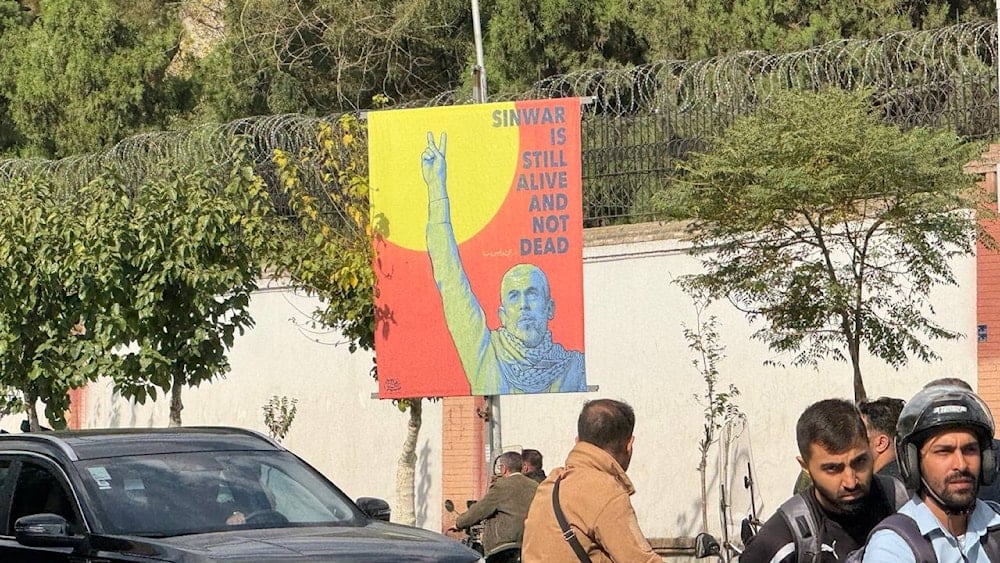Killing of Sinwar to have long-term impact on 'Israel': Politico
Former US diplomat Ryan Crocker urges "Israel" to seize any opportunity to achieve a ceasefire, particularly in the North, where UN Resolution 1701 could serve as a framework for de-escalation.
-

Banners of Commander Yahya Sinwar displayed outside the embassies of European and regional regimes in Tehran.(@IRIran_Military)
Politico published on Saturday an interview with former US ambassador Ryan Crocker regarding the recent martyrdom of Hamas leader Yahya Sinwar and its potential implications for the broader war between "Israel" and the Palestinian Resistance.
Crocker suggests that while the death of Sinwar could present an opportunity for recovering Israeli captives and possibly negotiating a ceasefire, history indicates that neither "Israel" nor the Resistance are likely to take that path.
To elaborate on this point, Crocker compares the current situation to "Israel’s" 1982 invasion of Lebanon, which inadvertently led to the creation of Hezbollah, which he views as a much stronger adversary than the Palestinian Liberation Organization (PLO) that "Israel" initially targeted.
He said, "That invasion and the subsequent Israeli occupation created Hezbollah. This invasion is not going to end it."
Delusional overconfidence
When asked if he is worried Israelis have become overconfident, he responded, "I worry that they’ve forgotten their own recent history."
"They hailed the operation 'Peace for Galilee' as a great victory after the PLO [Palestinian Liberation Organization] withdrawal from Beirut. And of course what they got was Hezbollah, a far more lethal enemy than the PLO ever dreamed of being. So the idea that a ground invasion and subsequent occupation is somehow going to make Galilee safer is delusional."
He further argues that military actions like strikes against Hamas leaders are unlikely to bring long-term peace.
Instead, he predicts a protracted guerrilla war, unless the US and "Israel" push hard for diplomatic efforts, including a ceasefire.
"One thing I've learned over years, especially in Iraq and Afghanistan, is that the concept of the defeat of an adversary only has meaning in the mind of that adversary. If that adversary feels defeated, he is defeated. If he doesn't, he's not."
Nuclear weaponization to speed up
Crocker also touches on the broader geopolitical landscape, noting that the Israeli response to a recent Iranian missile attack is still expected.
However, he predicts that if "Israel" avoids targeting Iran’s nuclear or oil infrastructure, it may not escalate the conflict, though any strikes on military or intelligence targets are unlikely to change the regional power dynamics.
"What I think it will do is push the debate inside Iran in the direction of nuclear weaponization sooner rather than later," he said.
Read more: IRGC chief criticizes THAAD missile system as 'ineffective'
Ceasefire still possible?
Finally, Crocker calls for a more strategic approach to diplomacy.
He urges "Israel" to seize any opportunity to achieve a ceasefire, particularly in the North, where UN Resolution 1701 could serve as a framework for de-escalation.
In Gaza, he advocates prioritizing efforts to secure the release of hostages as a way to move toward a cessation of hostilities.
However, he is doubtful that meaningful Israeli-Palestinian negotiations will emerge, especially given the actions of Israeli settlers and the Israeli Occupation Forces (IOF) in the West Bank, which he sees as undermining any hope for progress.
He cautions against Israeli overconfidence, drawing lessons from previous wars, and advises that any opportunity to achieve a ceasefire should be seized.

 3 Min Read
3 Min Read








